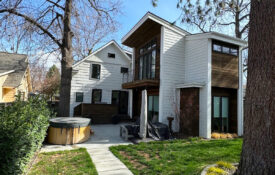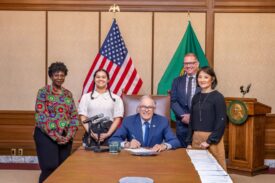Historic, first-in-US, state-wide affordability measure to allow missing middle homes cleared both House and Senate with wide bipartisan majorities.
Oregon Legislature Legalizes Duplexes, Triplexes, and Fourplexes State-Wide
Bipartisan cooperation on affordability—on the heels of partisan climate standoff
Oregon’s housing affordability measure, HB 2001, passed the House two weeks ago by 43-16, with two-thirds of both the Democratic and Republican caucuses in support. On Sunday, after reconvening from a last-minute Republican walkout that killed a major cap-and-trade bill and also nearly derailed this vote, the Senate followed, 17-9. (Senate vote count by caucus: D: 14-4; R: 3-5; House vote count by caucus: D: 28-9; R: 15-7). Democratic Governor Kate Brown is expected to sign the bill into law in early July.
Oregon trail blazes with first US state-wide zoning standards
Oregon legislators have passed the first law of its kind in the United States–or Canada: A state-level legalization of “missing middle” housing.
- See Sightline’s overview: Oregon Just Voted to Legalize Duplexes on Every Lot
- See our video explainer on upzoning: Invisible Walls Shutting You Out?
The bill sets baseline state-wide standards for cities, striking down local bans on duplexes for every low-density residential lot in all cities with more than 10,000 residents and all urban lots in the Portland metro area. In cities of more than 25,000 and within the Portland metro area, the bill would further legalize triplexes, fourplexes, attached townhomes, and cottage clusters on some lots in all areas where only single-detached houses are currently allowed. About 2.8 million Oregonians live in jurisdictions affected by the bill, about 90 percent of them in the fourplex areas.
Cities will have wide latitude to apply reasonable regulations on size and design, allowing them to craft local incentives that give a leg up to below-market homebuilders such as Habitat for Humanity.
Zoning reform backed by broad Oregon coalition
While opposition came from the Oregon League of Cities, among others, the coalition in favor of the legislation was robust: AARP of Oregon, argued middle housing makes it easier to age in place; The Street Trust urged lawmakers to consider how increased density would let more people live near good transit; 1000 Friends of Oregon said the law would advance the state’s long fight against exclusionary zoning; Pablo Alvarez of Lane County NAACP wrote that the bill would start to undo some of the ways racism has undermined housing affordability for all; Sunrise PDX called energy-efficient housing an essential way to fight climate change; and Portland Public Schools described the bill as a long-term way to reduce school segregation.
National Momentum and a Pacific Northwest Affordability Wave?
Seattle City Council set to vote Monday on ADU rules to allow gentle infill homes in single-detached residential neighborhoods. On Monday, July 1, Seattle’s City Council is likely to legalize up to two accessory dwellings, each up to 1,000 square feet, on every lot. Vote is scheduled for 2 PM PST.
Oregon’s Sunday vote puts the Pacific Northwest clearly at the front of a growing movement to improve affordability, equity, and sustainability with reform to urban zoning—especially low-density, high-opportunity areas. If Seattle’s ADU reforms also pass, they would be another historic leap toward greener, fairer, less expensive cities, placing Seattle at the forefront of progressive ADU policy in the United States.
State-level efforts similar to Oregon’s in Washington State got some traction in the 2019 legislative session, but are currently stalled. Cities across California have already witnessed tremendous growth in ADU construction since the state’s 2017 ADU reforms. Currently just one secondary cottage is legal on most residential lots in California; Assembly Bill 68 would raise that to two, following in Seattle’s footsteps. Minneapolis legalized triplexes on every lot last fall. And the City of Portland, Oregon, could pass its city-level fourplex legalization by the end of 2019.
Sightline housing policy researchers available for comment:
Please contact Communications Associate, Kelsey Hamlin to be connected with our policy experts—kelseyh@sightline.org:
Michael Andersen, senior researcher, based in Portland, Oregon, has been writing about ways better municipal policy can help break poverty cycles, with a focus on housing and transportation, for over a decade. He’s studied and written extensively about Oregon’s zoning reform effort. Find his latest research here.
Madeline Kovacs, senior outreach associate, based in Portland, Oregon, helps connect Sightline’s housing and urbanism research and policy analysis with people who can help put them into practice. Prior to joining Sightline, Madeline coordinated the Portland for Everyone coalition for 1000 Friends of Oregon, and helped found and co-direct Project Survival Media, a global youth journalism network.
Dan Bertolet, senior researcher, based in Seattle, Washington, leads Sightline’s housing and urbanism research program and has written extensively about exclusionary zoning and the affordability and sustainability benefits of added density. Prior to joining Sightline, he spent ten years in urban planning. Find his latest research here.
Margaret Morales, researcher, based in Seattle, is a policy analyst who has written extensively about the climate and community affordability benefits of accessory dwelling units. Margaret received her Master’s from The University of British Columbia’s Institute for Resources, Environment, and Sustainability where she was a Bridge Fellow focusing on issues of public health and the environment. Find her latest research here,
Alan Durning, executive director, founded Northwest Environment Watch in 1993, which became Sightline Institute in 2006. Alan’s current topics of focus include carbon pricing, housing affordability, and democracy reform. He has also written in recent years about parking, Making Sustainability Legal, car-free living, bike-friendliness, electric bikes, and climate fairness. Durning has written or contributed to nine Sightline books, including Unlocking Home: Three Keys to Affordable Communities, Cascadia Scorecard 2007, Tax Shift, Stuff: The Secret Lives of Everyday Things, and the award-winning This Place on Earth: Home and Practice of Permanence. Read Alan’s full bio, find his latest research here.
Founded in 1993, Sightline Institute is committed to making the Northwest a global model of sustainability, with strong communities, a green economy, and a healthy environment. We work to promote smart policy ideas and monitor the region’s progress towards sustainability.






